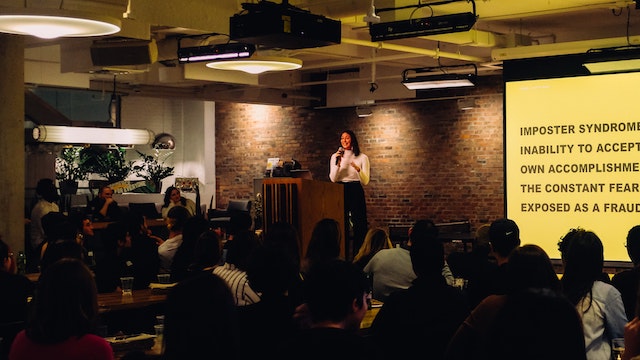Tech meet-up talks
A wish list for meet-up organisers 2022-09-27 #meetups

Dear tech meet-up organisers, I look forward to attending your upcoming in-person meet-ups I also have a wish list for your talks.
First-time speakers
Tech meet-ups can offer the ideal environment to welcome first-time speakers, especially when they can opt out of things that would stop them. Aspiring public speakers need this environment to gain confidence before approaching larger venues. Without this, we’d only have a smaller and less diverse group of talks to watch in all venues.
Two speakers
A meet-up with a single speaker can work, but a second speaker creates opportunity and reduces risk.
- One experienced speaker who you can rely on for a good talk, and one first-time speaker you can take a chance on. You usually get two good talks, and you reduce the risk of only having a bad one.
- One speaker who shows up if the other can’t make it. Relying on a single speaker means taking an unnecessary risk, and most speakers will have a second presentation they could give without preparation.
- If you have two speakers, you don’t have to invite two white men. A single speaker gives you less opportunity to represent your audience, especially since meet-up groups tend to include more junior attendees (and students) than conference.
30-minute talks
Enforce a strict half-hour maximum presentation length. Don’t expect anyone to pay attention for longer, after a working day. Instead, prioritise time for socialising. Besides, half the audience wants a bio break after 30 minutes, and the other half wants another drink.
Some organisers prefer a loose schedule for an informal meet-up, or don’t care what the speaker does, or want a famous speaker should talk for as long as possible. In practice, by the time a speaker has talked for over an hour, half the audience hates them. However famous. At least stop for a fifteen-minute break after the first 45 minutes.
15-minute talks
Some first-time speakers worry about not having enough to say, so tell them that you also welcome a short 10-15 minute talk. That also reduces the risk of reaching the 30-minute maximum.
Short talks leave more room for group discussion, which small meet-ups excel at. Organisers do need to take care to prevent hostile Q&A, though, especially with inexperienced speakers.
Edutainment
Conferences require educational talks, to unlock companies’ training budgets. Meet-ups serve different needs, and attendees expect more socialising (networking) and entertainment at evening events. Tech meet-ups can better achieve this balance with entertaining talks, or by scheduling an entertaining talk alongside an informative one.
Entertainment doesn’t have to mean cabaret, though. Switching from explaining concepts to telling stories goes a long way. A tech meet-up group could do worse than only having story-style talks.
Inclusivity
Unlike other industry venues, I’ve met people at tech meet-ups who haven’t yet joined the industry: university students, and people in other fields considering a coding boot camp. I want to attend inclusive meet-ups, which means that your meet-up needs a code of conduct. Moreover, you need a clear code of conduct that all organisers know how to enforce and actually will enforce.

